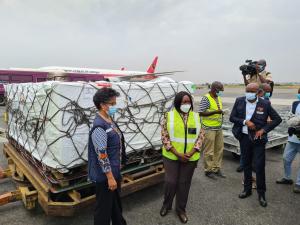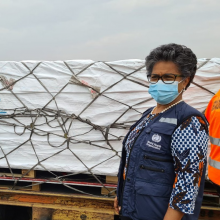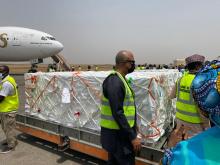Angola becomes the first country in Eastern and Southern Africa region to receive COVAX vaccines against COVID-19

Angola today became the first country in Eastern and Southern Africa region to receive the COVID-19 vaccine from the COVAX initiative, a partnership between CEPI, Gavi, UNICEF and WHO. The delivery of vaccines to the country is part of a first wave that will continue in the coming days and weeks, worldwide.
LUANDA – Angola today received 624,000 doses of the AstraZeneca-Oxford vaccine from the Sérum Institute of India as part of the COVAX initiative, which aims to ensure the equitable distribution of vaccines against COVID-19 worldwide.
With this first batch of vaccines, estimated at about 10 per cent of the country's first phase vaccine needs, the Government will immunize health professionals, vulnerable people and those with complicated comorbidities.
According to WHO Regional Director Dr. Matshidiso Moeti, with the arrival of vaccines provided by the COVAX initiative to fight COVID-19 in Angola, the continent marks another important step towards fairer access to vaccines.
"With this shipment, the first Portuguese-speaking country in Africa accesses this essential tool in the fight against the virus. Each new vaccine delivery marks a breakthrough in the fight against this pandemic that has held our lives hostage for too long. WHO teams in the region and partners have been supporting countries in planning and preparing for the complex challenges of such a massive vaccination campaign. We now hope to see these plans be put in place with an effective and efficient release of the vaccine," Moeti said.
Dr. Seth Berkley, CEO of Gavi, the Vaccine Alliance, emphasized that “COVAX's mission is to help end the acute phase of the pandemic as soon as possible, allowing global equitable access to vaccines against COVID-19”.
The COVAX initiative is playing a crucial role in global efforts to ensure fair, accessible and equitable access to vaccines against COVID-19 to the world's poorest countries, the most marginalised communities and the most vulnerable populations.
WHO Representative in Angola Dr. Djamila Cabral said that “the delivery of vaccines to Angola represents the manifestation of international solidarity and a stronger hope to save lives, and to help economies and livelihoods recover more quickly”.
"The start of the vaccination campaign offers us a light at the end of the tunnel for the protection of populations and also, an appeal to continue to work together to strengthen prevention measures against COVID-19, in particular compliance with biosafety standards, screening, and treatment, as well as improving access to health services and quality."
Mohamed M. M. Fall, UNICEF Regional Director for Eastern and Southern Africa, stated that “This is such a momentous occasion for the region. Of course, this is an initial tranche of COVAX vaccines, with more to follow. Over recent months, UNICEF has been preparing for this moment by working closely with all partners to make sure that the necessary logistical and planning arrangements are in place. UNICEF stands ready to fully support the roll-out of the COVID-19 vaccines as the drive against this deadly virus shifts into a higher gear.”
Meanwhile, Ivan Yerovi, UNICEF Representative in Angola congratulated the Government of Angola on its commitment to the fight against COVID-19, which makes the country the first in the region to receive COVAX vaccines.
"Today is a historic day in the fight against COVID19 in Angola. However, we should consider that the safe and effective vaccine against COVID-19 alone will not end the pandemic, we need to strengthen actions to slow the spread of COVID-19, including diagnosis and treatment, compliance with prevention measures such as hand washing, physical distancing and the use of masks."
Since the beginning of the COVID-19 pandemic, health workers have been at the forefront in risk scenarios, so it is expected with the delivery of COVAX vaccines and the subsequent vaccination that health and social care systems can offer, resume and or, strengthen essential services safely.
To ensure rapid access for the entire population to vaccines safe against COVID-19, the Ministry of Health, with the support of COVAX partners, developed a National Vaccination Plan, which among the various actions include strengthening the infrastructure of the cold chain, the storage of equipment, the training of vaccinators, the mobilisation of populations, as well as the management of disinformation on vaccination.
The arrival of vaccines against COVID-19 in Angola marks another milestone to achieve the goals of the COVAX initiative, as part of its unprecedented effort to provide at least 2 billion doses of vaccines by the end of 2021.
Notes to Editors
List of donor pledges to the Gavi COVAX AMC is available here.
About COVAX
COVAX, the vaccines pillar of the Access to COVID-19 Tools (ACT) Accelerator, is co-led by the Coalition for Epidemic Preparedness Innovations (CEPI), Gavi, the Vaccine Alliance Gavi) and the World Health Organization (WHO) – working in partnership with developed and developing country vaccine manufacturers, UNICEF, the World Bank, and others. It is the only global initiative that is working with governments and manufacturers to ensure COVID-19 vaccines are available worldwide to both higher-income and lower-income countries.
About CEPI
CEPI is an innovative partnership between public, private, philanthropic, and civil organisations, launched at Davos in 2017, to develop vaccines to stop future epidemics. CEPI has moved with great urgency and in coordination with WHO in response to the emergence of COVID-19. CEPI has initiated ten partnerships to develop vaccines against the novel coronavirus. The programmes are leveraging rapid response platforms already supported by CEPI as well as new partnerships.
About Gavi
Gavi, the Vaccine Alliance is a public-private partnership that helps vaccinate half the world’s children against some of the world’s deadliest diseases. Since its inception in 2000, Gavi has helped to immunise a whole generation – over 822 million children – and prevented more than 14 million deaths, helping to halve child mortality in 73 developing countries. Gavi also plays a key role in improving global health security by supporting health systems as well as funding global stockpiles for Ebola, cholera, meningitis and yellow fever vaccines.
About WHO
The World Health Organization provides global leadership in public health within the United Nations system. Founded in 1948, WHO works with 194 Member States, across six regions and from more than 150 offices, to promote health, keep the world safe and serve the vulnerable. Our goal for 2019-2023 is to ensure that a billion more people have universal health coverage, to protect a billion more people from health emergencies, and provide a further billion people with better health and wellbeing.
About UNICEF
UNICEF works in some of the world’s toughest places, to reach the world’s most disadvantaged children. Across 190 countries and territories, we work for every child, everywhere, to build a better world for everyone. For more information about UNICEF and its work for children, visit www.unicef.org. For more information about COVID-19, visit www.unicef.org/coronavirus . Find out more about UNICEF’s work on the COVID-19 vaccines here, or about UNICEF’s work on immunization here.
Oficial de Comunicação
Escritório da OMS em Angola
gamboo [at] who.int (gamboo[at]who[dot]int)
T: +244 923 61 48 57
Communications Officer
WHO Regional Office for Africa
E-mail: ribetk [at] who.int (ribetk[at]who[dot]int)
Tel : +27 780 574 687
Communication Specialist, UNICEF
Tel: +244 226 430 870 Ext: 4481 | Mobile: +244 936 185 551
Email: epaim [at] unicef.org (epaim[at]unicef[dot]org)





